
BIOGERONTOLOGY
Scope & Guideline
Exploring the Science of Aging for a Healthier Tomorrow
Introduction
Aims and Scopes
- Cellular Senescence and Aging Mechanisms:
The journal delves into the cellular and molecular mechanisms underlying senescence, including the role of cellular stress, oxidative damage, and the impact of various biochemical pathways on aging. - Dietary Interventions and Aging:
Research on the effects of dietary restrictions, caloric restriction mimetics, and specific dietary components (such as polyphenols and antioxidants) on healthspan and lifespan is a prominent theme. - Therapeutic Approaches to Age-Related Disorders:
The journal includes studies on pharmacological interventions, such as senolytics and geroprotective agents, aimed at mitigating age-related diseases and improving longevity. - Microbiota and Aging:
Investigations into the gut microbiome's influence on aging processes and its potential therapeutic implications are increasingly featured. - Sex Differences in Aging:
The journal explores how biological sex impacts aging processes, health outcomes, and responses to interventions, highlighting the importance of sex-specific research. - Genetics and Aging:
Research on genetic factors that influence longevity, including the role of non-coding RNAs, telomere biology, and epigenetic modifications, is a key focus area. - Neurodegeneration and Aging:
The journal addresses the relationship between aging and neurodegenerative diseases, examining mechanisms and potential therapeutic strategies. - Environmental and Lifestyle Factors in Aging:
Studies assessing how environmental exposures, lifestyle choices, and stressors affect aging and longevity are also explored.
Trending and Emerging
- Advancements in Senolytics and Cellular Clearance:
The exploration of senolytic compounds that selectively eliminate senescent cells is a rapidly growing area, highlighting their potential to improve healthspan and combat age-related diseases. - Microbiome Research in Aging:
Research focusing on the gut microbiome's role in aging and its therapeutic potential is emerging as a significant theme, recognizing the microbiome's influence on health and longevity. - Integration of Omics Technologies:
The use of multi-omics approaches (genomics, proteomics, metabolomics) to study aging mechanisms is on the rise, providing comprehensive insights into the biological underpinnings of aging. - Focus on Healthspan Over Lifespan:
There is a notable shift towards emphasizing healthspan, or the period of life spent in good health, as opposed to merely extending lifespan, reflecting a holistic approach to aging. - Exploration of Environmental Factors:
Research examining the impacts of environmental factors, including radiation and pollutants, on aging and longevity is gaining attention, particularly in light of global health challenges. - Innovative Therapeutic Strategies:
Emerging therapies that target aging processes at the cellular level, such as gene editing and stem cell therapies, are being increasingly explored for their potential to rejuvenate tissues and improve health outcomes. - Personalized Medicine in Aging:
There is a growing interest in personalized approaches to aging interventions, utilizing genetic and epigenetic profiling to tailor therapies for individual aging processes.
Declining or Waning
- Traditional Models of Aging:
Research using traditional model organisms, such as rodents, is becoming less prevalent as the field moves towards more complex models (e.g., primate studies) that better reflect human aging. - Isolated Studies on Single Pathways:
There is a trend away from focusing solely on individual signaling pathways, with a shift towards more integrative approaches that consider the interconnectedness of various biological processes in aging. - Aging and Disease Correlation Without Mechanistic Insights:
Papers that simply correlate aging with diseases without delving into underlying mechanisms are becoming less common, as there is a growing demand for studies that provide mechanistic explanations. - Generalized Dietary Recommendations:
Research that offers broad dietary recommendations without specific biochemical or genetic insights is waning, as more precise and personalized dietary interventions gain traction.
Similar Journals

Frontiers in Aging
Fostering Multidisciplinary Dialogues on AgingFrontiers in Aging is a leading academic journal published by FRONTIERS MEDIA SA, dedicated to advancing the understanding of the biological processes associated with aging. Established in 2020, this open-access journal aims to bridge the gap between various disciplines including genetics, molecular biology, and physiology, providing a multidisciplinary platform for researchers and clinicians alike. With a notable impact factor denoted by its Q2 quartile rankings in Aging, Genetics, and Molecular Biology, and a Q1 ranking in Physiology as of 2023, the journal is recognized for its contribution to the scientific community. Located in Lausanne, Switzerland, it is committed to promoting open discourse and publishing cutting-edge studies that address the complexities of aging and its implications for health and longevity. The journal’s editorial board, consisting of leading experts, ensures the rigorous peer-review process, maintaining high academic standards and fostering innovation in aging research.

Innovation in Aging
Advancing knowledge for a healthier, aging society.Innovation in Aging, published by Oxford University Press, is a prestigious open-access journal dedicated to advancing the understanding of aging and its implications on health and society. Established in 2017, the journal has rapidly gained a strong reputation within the academic community, achieving Q1 rankings in multiple categories including Health Professions, Health (Social Science), and Life-span and Life-course Studies, with impressive Scopus rankings that place it among the top journals in its field. With an emphasis on innovative research and interdisciplinary approaches, Innovation in Aging aims to foster dialogue among researchers, professionals, and policymakers, addressing key challenges and breakthroughs in gerontology, geriatrics, and related disciplines. As an open-access journal, it provides accessible content to a wide audience, supporting knowledge dissemination and collaboration to improve the quality of life for aging populations. This journal is essential for those looking to stay at the forefront of aging research and its impact on health and society.
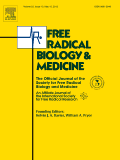
FREE RADICAL BIOLOGY AND MEDICINE
Leading the Charge in Free Radical Research since 1987FREE RADICAL BIOLOGY AND MEDICINE, published by Elsevier Science Inc, is a premier journal dedicated to the field of biochemistry and medical physiology. With an ISSN of 0891-5849 and an E-ISSN of 1873-4596, this journal stands out with its impressive ranking in the 2023 category quartiles: Q1 in Biochemistry and Q1 in Physiology (medical). Specifically, it has achieved a remarkable position of 29th out of 438 in Biochemistry and 8th out of 113 in Physiology, placing it firmly in the 93rd percentile of its field, as per Scopus rankings. Since its inception in 1987, the journal has focused on advancing the understanding of free radicals and their role in biological processes, encompassing a wide range of topics from oxidative stress to therapeutic applications. Although it does not currently offer open access, the journal's rigorous peer-review process and impactful research ensure that it remains a valuable resource for researchers and professionals seeking to explore the intricate relationships between free radicals and health. The journal's headquarters are located at STE 800, 230 Park Ave, New York, NY 10169, reflecting its esteemed place within the scientific community and commitment to high-quality research.
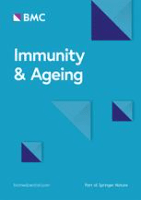
Immunity & Ageing
Advancing Research at the Intersection of Health and TimeImmunity & Ageing is a distinguished open access journal published by BMC, committed to advancing the understanding of the interplay between immunological processes and aging. Since its inception in 2004, this journal has established itself as a leading platform for disseminating quality research, evidenced by its Q1 rankings in both Aging and Immunology categories for 2023. With an impressive Scopus ranking that places it in the top percentile of related fields, it serves as an essential resource for researchers, professionals, and students eager to explore the nuances of immune aging and age-related diseases. The journal's open access policy ensures wide accessibility and visibility, promoting collaborative discourse and innovation across the global scientific community. Based in the United Kingdom, Immunity & Ageing is set to continue its significant contribution to the field, inviting submissions that push the boundaries of knowledge and application in immunology and gerontology.
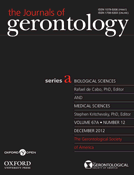
JOURNALS OF GERONTOLOGY SERIES A-BIOLOGICAL SCIENCES AND MEDICAL SCIENCES
Exploring Innovations in Aging and Health CareJournals of Gerontology Series A: Biological Sciences and Medical Sciences, published by Oxford University Press Inc, stands at the forefront of aging research, bridging the gap between biological sciences and medical practices to address the complexities of gerontology. With an impressive impact factor reflecting its significant contribution to the field, this journal is recognized within the Q2 quartile in Aging and the Q1 quartile in Geriatrics and Gerontology for 2023, evidencing its high-quality scholarship and relevance. Researchers and professionals will find valuable insights through its comprehensive coverage of aging-related topics, informed by cutting-edge studies ranked among the top in their category—Rank #11 in Geriatrics and Gerontology and Rank #9 in Aging on Scopus. The journal aims to disseminate innovative research that can impact health care practices and enhance the quality of life in older populations. For those engaged in studies of aging, this journal offers a vital platform for sharing knowledge and advancing the understanding of biological and medical sciences as they pertain to gerontology.
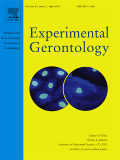
EXPERIMENTAL GERONTOLOGY
Illuminating the Pathways of Aging with Cutting-Edge ResearchEXPERIMENTAL GERONTOLOGY is a prestigious journal published by PERGAMON-ELSEVIER SCIENCE LTD, dedicated to the evolving field of aging research. With a rich history dating back to 1964 and continuing through 2024, this journal aims to advance the understanding of the biological processes underlying aging and develop interdisciplinary approaches to improve healthspan. ENCOMPASSING a broad scope, including *biochemistry*, *cell biology*, *endocrinology*, *genetics*, and *molecular biology*, it holds impressive rankings in the 2023 Scopus Ranks, featuring in Q1 and Q2 quartiles across multiple categories. This positions it as a vital resource for researchers and professionals focused on gerontology and related fields. As a subscription-based journal without open access, EXPERIMENTAL GERONTOLOGY ensures the dissemination of high-quality research through rigorous peer review, making it an essential publication for those aspiring to remain at the forefront of aging studies.

EXPERIMENTAL AGING RESEARCH
Innovating Knowledge for a Longer LifeEXPERIMENTAL AGING RESEARCH, published by Taylor & Francis Inc., is a leading journal that has been at the forefront of aging research since its inception in 1975. With an ISSN of 0361-073X and an E-ISSN of 1096-4657, this journal has earned a notable reputation, including a Q3 ranking in the field of Aging and impressive Q1 and Q2 rankings in Arts and Humanities and Geriatrics and Gerontology respectively. This positions the journal within the top percentile of its category, highlighting its significant impact and contribution to the scientific community. Covering a broad scope that intersects various disciplines, EXPERIMENTAL AGING RESEARCH aims to disseminate pioneering research, foster interdisciplinary collaboration, and provide a platform for innovative studies that enhance understanding of the aging process. While it currently does not offer Open Access, researchers and academics can access its rich repository of knowledge that spans multiple facets of aging, from physiological changes to psychological impacts. As the field of aging continues to evolve, this journal remains an essential resource for researchers, professionals, and students dedicated to advancing knowledge and practices concerning aging and longevity.
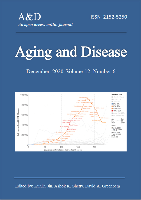
Aging and Disease
Exploring the intersection of longevity and health.Aging and Disease is a leading open-access journal published by the International Society on Aging and Disease, dedicated to advancing the understanding of aging and its associated diseases. Since its inception in 2010, the journal has established itself as a vital resource for researchers and practitioners in the fields of Geriatrics, Neurology, Cell Biology, and Pathology. With an impressive Q1 ranking across multiple categories and a robust position in Scopus rankings, including ranks in the top 3% in Geriatrics and Gerontology, it showcases high-quality research that addresses the complexities of aging processes. Each issue presents original articles, reviews, and insights aimed at improving health outcomes for the aging population. The open-access model ensures that valuable research findings are readily available to a global audience, fostering collaboration and innovation. As a go-to publication for scholars, healthcare professionals, and students, Aging and Disease significantly contributes to the multidisciplinary dialogue surrounding aging and its health implications.

GeroScience
Pioneering Discoveries in Geriatric HealthGeroScience, published by Springer, is an esteemed open-access journal that focuses on the multidisciplinary field of aging research. Since its inception in 2017, the journal has quickly established itself as a leader in its field, achieving impressive Q1 quartile rankings across various categories, including Aging, Cardiology and Cardiovascular Medicine, Geriatrics and Gerontology, and Complementary and Alternative Medicine, as per 2023 evaluations. With a significant impact factor that underscores its influence and reach in academia, GeroScience aims to disseminate high-quality research that addresses the complex challenges and advancements related to aging. Its accessible publication format fosters greater dissemination of knowledge and encourages collaboration among researchers, practitioners, and students eager to contribute to the growing body of work on age-related health issues. As it continues to thrive, GeroScience remains a pivotal resource for anyone looking to stay at the forefront of aging research.

Lancet Healthy Longevity
Fostering Global Insights for a Healthier TomorrowThe Lancet Healthy Longevity is a premier journal published by Elsevier that focuses on advancing our understanding of healthy aging and longevity through interdisciplinary research. Established in 2020, this Open Access journal is committed to disseminating innovative findings that enhance public and individual health, making it accessible to a global audience. The journal is proud to be recognized with a Q1 ranking in critical categories such as Family Practice, Geriatrics and Gerontology, Health (Social Science), and Psychiatry and Mental Health, indicating its prominent role in shaping contemporary discourse in these domains. As one of the leading titles within the field, it holds an influential position in Scopus rankings, with top placements in Geriatrics and Gerontology as well as Family Practice, thereby reaching the 99th percentile of scholarly impact. The Lancet Healthy Longevity aims to foster collaboration among researchers, healthcare professionals, and policymakers to promote healthy longevity, ultimately supporting the growing aging population worldwide. With its commitment to high-quality research and global accessibility, this journal is a vital resource for those dedicated to improving health outcomes across the lifespan.